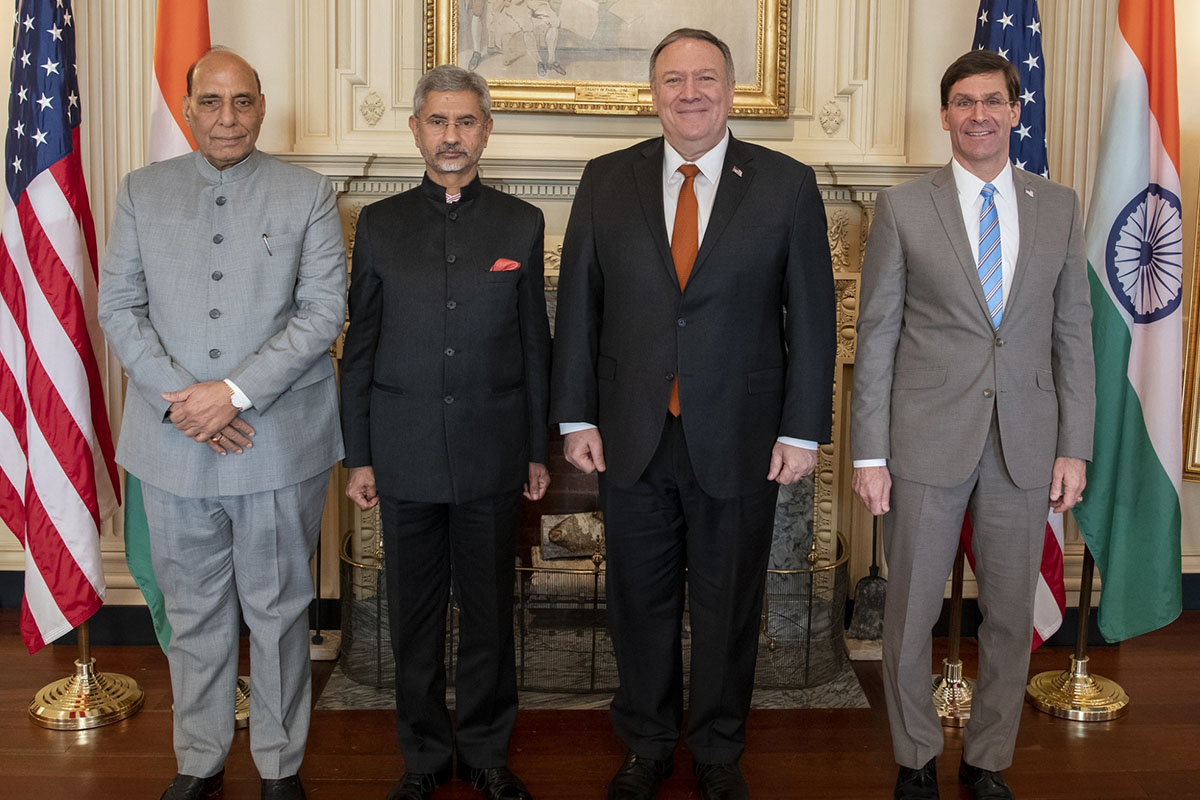The Basic Exchange and Cooperation Agreement (BECA), a breakthrough pact for sharing important strategic information, is likely to be signed during the 2+2 ministerial dialogue between the top foreign affairs and defence officials of India and the US next week, a senior official in President Donald Trump’s administration has hinted.
“We’ve made significant progress towards concluding the last foundational defence enabling agreement, the BECA,” the official told reporters on Friday ahead of Secretary of State Mike Pompeo and Defence Secretary Mike Esper’s visit to India for the 2+2 meeting.
Advertisement
“This agreement will allow for expanded geospatial information sharing between our armed forces.
“We are also seeking to expand secure communication capabilities between our respective militaries as well as between our foreign and defence ministries, and that too figures prominently on what we’re trying to accomplish in the information-sharing space,” the official said on the basis of anonymity.
In preparation for it on the Indian side, the cabinet approved the BECA, which had been submitted by the Defence Ministry on Wednesday.
BECA will enable sharing geospatial intelligence and information on maps and satellite images for defence and also have applications in times of disaster to organise relief.
India will be represented by Minister for External Affairs S Jaishankar and Defence Minister Rajnath Singh at the 2+2, which will be held a week before the November 3 US presidential election.
The official said that the US would welcome greater Indian participation in Southeast Asia through a presence in the South China Sea, but also through security cooperation and development investments.
“We’ve had ongoing dialogue with the Indians about increased cooperation in Southeast Asia writ large, not simply the South China Sea, and we encourage their involvement.
“Given China’s increasingly aggressive behaviour across the Indo-Pacific from the Himalayas to the South China Sea, it’s more important than ever that we work with like-minded partners such as India,” the official said.
Asked if the US election outcome could impact the cooperation between New Delhi and Washington on countering China, the official said: “I fully expect, have no reason to believe that in the event of there being a new administration following the upcoming elections here in the US that the policy with regard to India would change. I think both parties are largely aligned on their interest in supporting and deepening the partnership.”
The official said that Washington was “covering the situation in the Himalayas closely, and understandably. And we certainly want to ensure that the situation doesn’t escalate”.
“Certainly we are providing support, whether through defence sales, exercises a as well as information sharing… These are all areas where we cooperate with the Indians on, and not just as it relates to the tensions in the Himalayas.”
The official said that while Washington is working to enhance maritime security in the Indo-Pacific region India’s invitation to Australia to join next month’s Malabar naval exercise with Japan and the US “signals not only a strategic convergence between the Quadrilateral partners but a recognition that regional security requires strengthening allies and partnerships and working multilateral on issues of mutual concern”.
Asked about its future, the official said that the Quad — made up of India, the US, Japan and Australia — is not a formal alliance with reciprocal obligation among its participants and does not seek members, but “there are many different dimensions in which it can grow and expand, and more… All activities are on the table, and meetings among officials in different places and at different levels and with different subject matter focuses”.
“So I think all of us are open to additional cooperation, coordination, and common activity. And I expect that the next year will see even more alignment of activities among the four countries in the Quad, and hopefully those that will bring in other like-minded nations as well.”
Asked about the Trump administration’s restrictions on student H1-B professional visas that are heavily impacting Indians, the official said the measures were not directed against New Delhi.
“Our current visa policy is based on US interests in protecting some, the American homeland and respect for American immigration law. None of the current restrictions have anything to do with any specific country, and many of them have a lot to do with the Covid-19 pandemic.
“So I think we would be looking to see some changes in global travel patterns and easing of pandemic restrictions globally before we would see a really substantial change in any of our visa and immigration policies at the moment,” he added.
In dealing with the coronavirus pandemic and health issues, the official said: “Joint efforts to develop and produce Covid-19 vaccines have taken off at a remarkable pace. More than half a dozen American companies and institutions are working on vaccine research with Indian partners like the Serum Institute of India.
“We know that going forward, working closely with India and its robust research and pharmaceutical sectors will be critical to finding and implementing a cure for infectious diseases.”
(Arul Louis can be reached at arul.l@ians.in and followed on Twitter at @arulouis)











